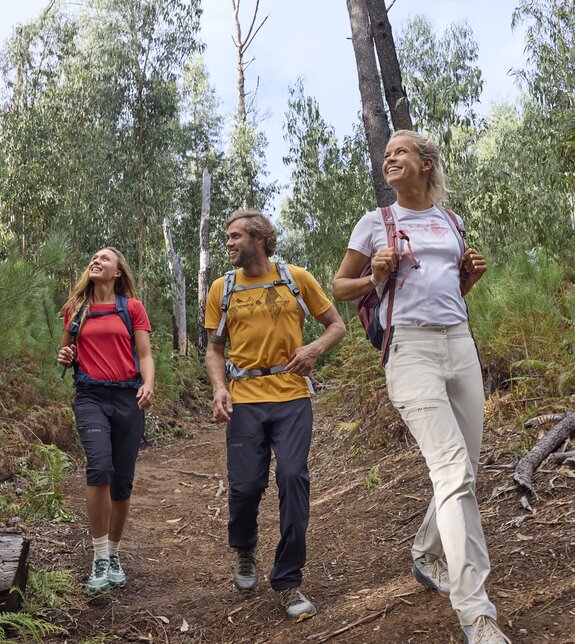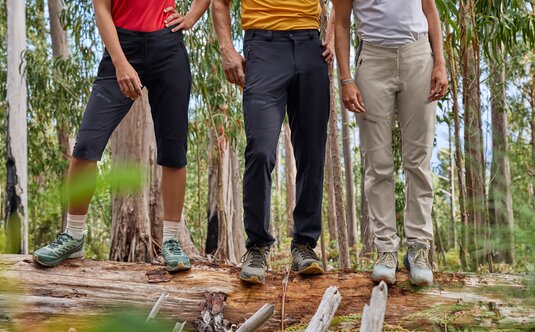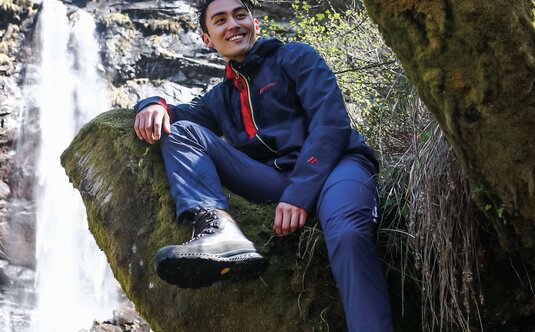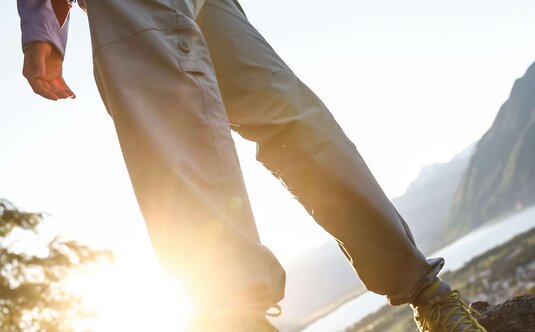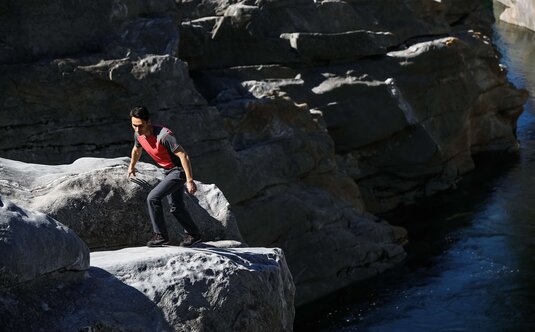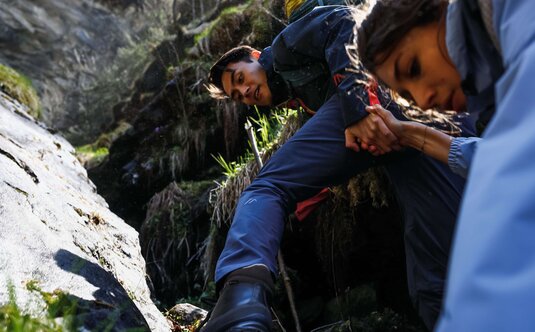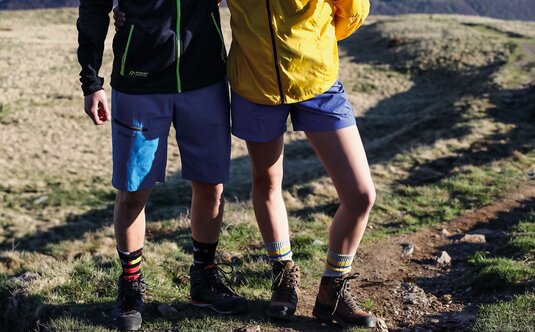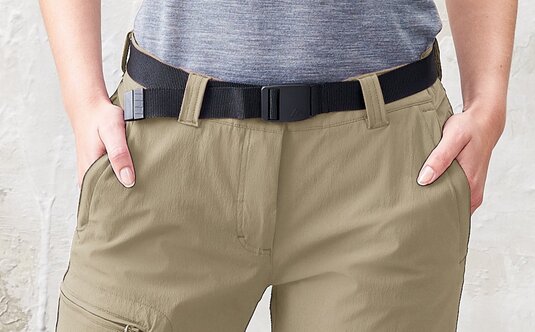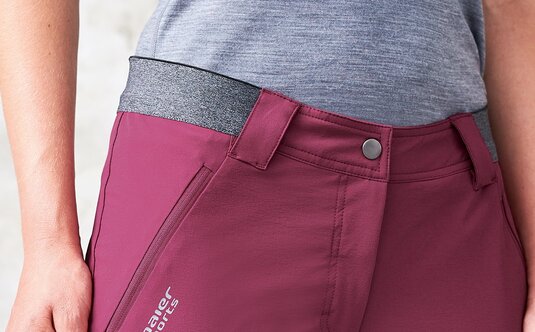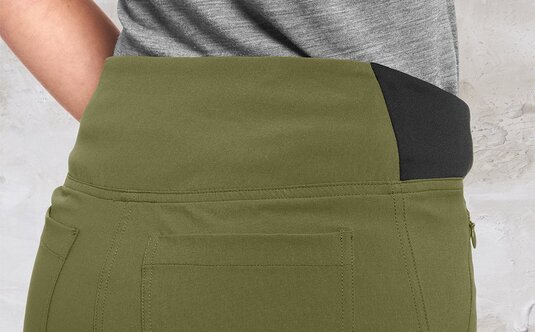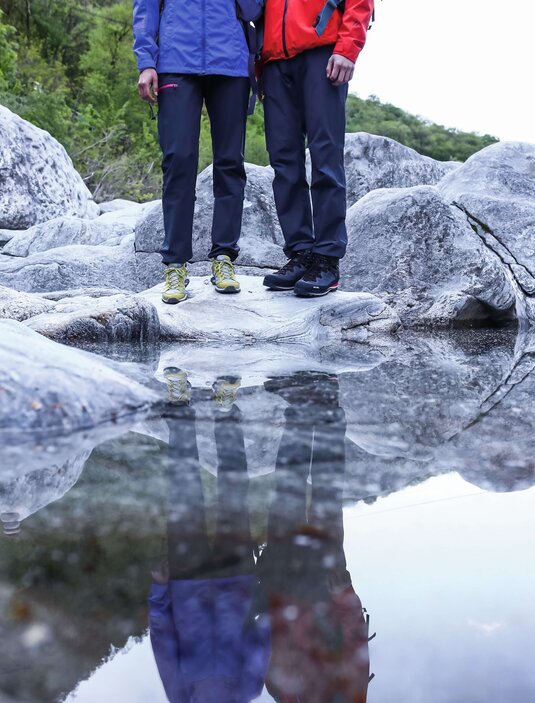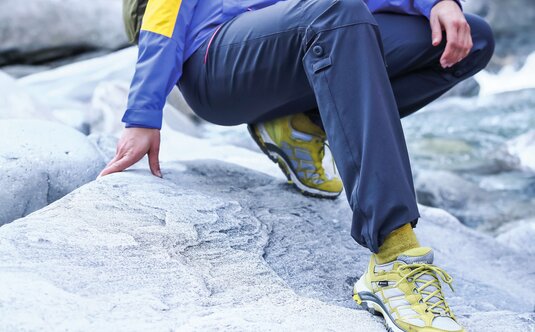Soldes d'hiver outdoor ! - 30 % sur la collection outdoor actuelle
Due to maintenance work on this site, there may be delays in the display of product images.
COMMENT TROUVER LE BON PANTALON DE RANDONNÉE
Guide du pantalon de randonnée
Comfortable hiking pants are a must in every wardrobe. They are not only useful for hiking, but also for any outdoor activity. And they outlive all fashionable trends. However, there are so many different kinds to choose from nowadays that you shouldn’t simply just buy any hiking pants. Because if you choose the wrong model, a lot of the time you’ll notice that the pants are anything but functional when in use.
What makes good hiking pants ?
The following buyer’s guide will help you find your perfect hiking pants. This overview lets you jump to the topics that interest you:
1.) Types: Find the right outdoor pants
2.) Fit: Hiking pants that fit perfectly
3.) Cut: This makes hiking pants stand out
4.) This makes hiking pants functional
5.) What is the right waist for me?
7.) How waterproof should my pants be?
8.) Workmanship: What to look for
9.) Clever details make all the difference
Do I need hiking pants, outdoor pants, functional pants or trekking pants?
These four terms are often used as synonyms. Strictly speaking, they’re not the same. The fact is that hiking pants have been developed specifically for hiking, therefore they are abrasion-proof, breathable, stretch and have many practical details. All these features together make hiking pants very functional.
Trekking pants differ to hiking pants in that the material and finish are more robust. This is because you need to be comfortable for several days at a time when trekking. They also have to be able to dry quickly e.g. with dryprotec.
However, outdoor pants or functional pants are umbrella terms, which include all types of outdoor activities, therefore less clearly defined. Some manufacturers equip outdoor pants/functional pants with lots of functions. However, others make them barely distinguishable from standard cotton pants by adding just a few details that are suitable for the outdoors. Moreover, many functional pants nowadays are also suitable for everyday use.
Maier Sports has something for all needs, ranging from everyday functional pants to technically advanced hiking pants. In fact, all of our pants are functional and suitable for active outdoor use.
There is only one important difference: our functional pants are even more versatile whereas our hiking pants have been developed especially for long walks in the outdoors. Moreover, you will also find proper all-purpose outdoor pants such as our best-rated pants for hiking and travelling – multi-award-winning hiking pants with a plethora of functions and practical features.
Fit: Hiking pants have to fit perfectly!
Hiking pants, or functional pants, have to be able to do everything: fit properly but also allow great freedom of movement; be close-fitting but not cut into anywhere; be worn over hiking boots but not flap around or drag in the dirt. And all that regardless of the figure Mother Nature gave us!
When it comes to the perfect fit, Maier Sports is your specialist. Maier Sports has perfect fitting hiking pants for every figure thanks to 25 sizes for women and 36 for men.
As the waist circumference, thigh width, hip width, leg muscles and leg length can vary greatly from person to person, and the right fit is essential for a comfortable fit, we won’t force you into the five classic clothes sizes of S to XXL.
Women under 1.68 m and men under 1.74 m can choose between 10 and 14 different short sizes respectively. The normal sizes – for women from 1.68 m and men from 1.74 m – are also available in 10 and 14 sizes respectively. The long sizes, for people who are too tall for the normal sizes, come in five cuts for women and eight for men.
Cut: What cut is suitable for hiking?
In addition to the fabric, workmanship and features, hiking pants also have a different cut compared to everyday pants. The knee sections should be preformed if you want to be able to make wide and high steps easily when climbing or scrambling (or kneeling down). This is why the pants have a slightly curved cut. Moreover, details such as pockets should not limit freedom of movement or cause friction, even when filled.
The question then remains whether the cut of the hiking pants should be form-fitting (slim) or loose (regular). There are advantages to both cuts. Fashionable form-fitting hiking pants rub less and do not flap around. Loose-fitting pants have a more relaxed fit and provide better ventilation. In turn, you benefit from Maier Sports’ numerous sizes and product range (with slim and regular cuts): try them out for yourself and choose the version that makes you feel more comfortable.
Functional fabric: What is the best fabric for my hiking pants?
The highest demands are placed on the fabric of hiking pants. This is why an all-rounder would make the best choice. On the one hand you never know exactly what the weather is going to be like. On the other hand you don’t want to have to buy special pants for every type of weather. The good news: you won’t need to if you choose a high-quality fabric.
Modern textile technologies manage to unite high breathability, insulation, strong elasticity, quick-drying time, wind resistance and a waterproof finish. Cotton can’t do any of this.
But there’s one thing you do need to know: not a single textile technology can guarantee all of these demands completely. So you will always have to compromise on one or more properties. The questions you should ask yourself, and only you can answer, are:
- What demands do my hiking pants need to fulfil?
- How environmentally friendly is the fabric?
Maier Sports can easily answer the second question. Since Fall/Winter 2018/2019, all Maier Sports products have a PFC-free finish. Our PFC-free finish is biodegradable and protects people's health and nature. Furthermore, we have managed to improve wash resistance, the simple reactivation of the water repelling effect and abrasion resistance without using environmentally damaging chemicals and to optimise the durability of our hiking pants.
However, when it comes to deciding what your hiking pants need to cope with, you first need to think about what kind of hiking tours you are planning to go on. How sweaty will it get? What will the weather be like? And how long will your tour take? Then you will know, which of the following textile technologies you need.
Against rain: mTEX 10,000
When you are exposed to minutes or hours of constant rain, then our mTEX 10.000 weather protection membrane is just the thing for you. “10.000” stands for a water column of 10,000 mm, which means that it would take 100 seconds of permanent (!) water pressure for drops of water to form on the reverse side of the fabric. According to the European standard, pants with a water column from 800 mm are rated Class 2 waterproof and from 1,300 mm Class 3 waterproof. This shows that mTEX 10.000 is clearly higher than the standard.
Against odours: Silverplus®
Silverplus® technology is very useful for trekkers who have to wear the same hiking pants for several days in a row. This is because silver ions in the fabric give the pants an anti-bacterial and odour-inhibiting effect. More precisely, they prevent bacteria cells from breathing, in turn letting them die. Furthermore, clothing with Silverplus® is very skin-friendly and environmentally friendly.
Against moisture: Dryprotec
You won’t want to do without dryprotec during intensive activities such as mountain climbing or strenuous pursuits such as hiking in warm weather. Fabric with this technology transports moisture quickly and effectively away from the body. This prevents evaporation, unpleasant moisture build-up and subsequent shivering. Moreover, hiking pants with Dryprotec dry quicker than other functional pants, making them low maintenance. Therefore, a clear recommendation for trekkers.
Against wind: Stormprotec
The name says it all: this technology protects you from the wind, even during a storm. But the softshell fabric is also water-repellent and abrasion-proof. This makes it the perfect all-purpose fabric. However, as the upper body is usually affected by the wind and then starts to cool, hiking pants only need Stormprotec for adverse weather conditions and tours in higher locations. For instance, these women’s technical softshell hiking pants for cold and windy days (go to women’s tech pants) or these men’s softshell hiking pants (go to men’s tech pants).
Waist solution: What is the right waist for me?
A perfect fit comes from more than just cut, length and width. The right waist is essential. It has to fit properly, can’t be too tight or wide and should follow your every move.
The perfect waist needs extensive anatomical knowledge. You have to know about different body shapes to get it right. Realise what the relationship is between the waistline, bottom and hips. The right waist requires technical understanding, creativity and craftsmanship.
Thanks to more than 80 years of experience, we at Maier Sports have developed a number of waist solutions, which ensure that our pants fit. Different waist solutions for different purposes, styles and body shapes.
Insulation: What insulation should my hiking pants have?
The question regarding the insulation or thermal output of hiking pants is pretty easy to answer. There are generally three types of hiking pants: padded, lined and ones which are nether padded nor lined.
You usually need padded or lined hiking pants when the temperature is below 10 °C. Padded pants are always slightly warmer than lined ones. Whatever you choose depends on how sensitive you are to cold as well as the temperature of the surroundings where you are going to be hiking.
Hiking pants with high-quality padding (go to Rechberg Therm), such as mTHERM, feel nice and soft on the skin and allow you to go hiking even when the temperature is below zero. You will also find the same hiking pants but lined for just cool days (go to Rechberg) in the Maier Sports range.
Also important to know: hiking pants aren’t supposed to be thickly padded. This is because you give off very little heat over the legs. Instead, hiking or any other physical activity is good for your circulation and will “warm” you in a natural way.
But if you choose pants that are too warm, then heat will build up and make it very unpleasant. Therefore, robust and padded winter functional pants or hiking pants (go to Helga hiking pants) should really only be considered for winter activities.
Waterproof finish: How do waterproof finishes differ for hiking pants?
First and foremost: the more waterproof the clothing is, the less breathable it can be. If you are looking for hiking pants that can also withstand heavy rain (discover rain pants), then you need to know that they will only be suitable for heavy rain. As soon as the sun comes out and it gets warmer, they will no longer be as comfortable as pants that offer less protection from the rain.
This means: as you would normally avoid hiking in constant rain, breathable hiking pants should always be your first choice. Should you encounter light or short spurts of rain, then the pants will repel some of the moisture and then dry quickly afterwards. Rain pants are a perfect additional item of clothing, but they cannot replace hiking pants.
Workmanship: What do I need to pay attention to regarding the workmanship of my hiking pants?
In our opinion, there are two important aspects regarding workmanship: quality and sustainability. For this reason, not only the hiking pants from Maier Sports are PFC-free, but also our entire outdoor clothing range. This means: no perfluorinated and polyfluorinated chemicals, which are very difficult to degrade and are a burden to the environment for decades.
And what about the quality? We are convinced that something can only be of high quality when it meets your needs and lasts for a long time.
As we are convinced of the quality of our products, we at Maier Sports give all our consumers a 5-year guarantee. This guarantee not only applies to our hiking pants, but also to all our products.
And what are your needs? Our philosophy: for something to work, it first has to fit. Functional pants are not supposed to rub, slip, pinch or drag along the floor. Only then will you feel comfortable and only then can functionally designed clothing perform all its functions. This is why we endeavour to guarantee precisely this, also online, with our Maier Sports perfect fit promise.
Last but not least, this buyer’s guide will help you find your perfect hiking pants.
Sophisticated details: What practical details should hiking pants have?
Additional functions and features such as pockets, roll-ups, detachable legs, reflective elements, adjustable leg widths, mesh inner linings or zip covers make hiking pants versatile and practical. To go into all the details here would digress too much.
But it's useful for you to know: Maier Sports has four different zip technologies that turn long pants into 3/4 pants (also called Capri pants) and/or into shorts:
- Zip-off: The classic zip-off version lets you shorten the pants above the knees with one zip.
- Double zip-off: The double zip-off is more versatile. It lets you zip off the pants above the knees and below the knees. So you can have long pants, 3/4 pants and shorts for the price of one.
- T zip-off: Hiking pants with a T zip-off give you the advantage of being able to detach the legs without having to take off your chunky hiking boots.
- 3/4 zip-off pants: If you don’t want to show too much leg, then you will also find hiking pants with a 3/4 zip-off at Maier Sports. These pants let you detach the legs below the knees.
You will only find fashionable elements with reflectors on hiking and functional pants where it actually makes sense. This applies to pants that would normally be worn in poor visibility conditions. This is why our women’s and men’s rain pants have reflective elements, but our light summer hiking pants don’t.
0 Article

